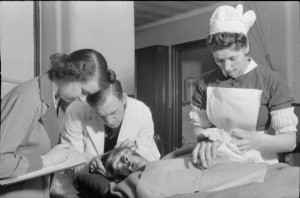Why Don’t Doctors Round With Nurses Anymore?
 Whenever possible I make a point of rounding on patients with their nurses present. I rely on nurses to be my eyes and ears when I’m not at the bedside. I need their input to confirm patient self-reports of everything from bowel and bladder habits to pain control, not to mention catching early warning signs of infection, mental status changes, or lapses in safety awareness. Oftentimes patients struggle to recall bathroom details, and they can inadvertently downplay pain control needs if they don’t happen to be in pain when I visit them. A quick check with their nurse can clarify (for example) that they are asking for pain medicine every 2 hours, that they have missed therapy due to somnolence, that their wound incision looks more red, and/or that they haven’t had a bowel movement in a dangerously long time. All critical details that I wouldn’t necessarily know from talking to the patient alone. Some of this information is not accurately captured in the electronic medical record either.
Whenever possible I make a point of rounding on patients with their nurses present. I rely on nurses to be my eyes and ears when I’m not at the bedside. I need their input to confirm patient self-reports of everything from bowel and bladder habits to pain control, not to mention catching early warning signs of infection, mental status changes, or lapses in safety awareness. Oftentimes patients struggle to recall bathroom details, and they can inadvertently downplay pain control needs if they don’t happen to be in pain when I visit them. A quick check with their nurse can clarify (for example) that they are asking for pain medicine every 2 hours, that they have missed therapy due to somnolence, that their wound incision looks more red, and/or that they haven’t had a bowel movement in a dangerously long time. All critical details that I wouldn’t necessarily know from talking to the patient alone. Some of this information is not accurately captured in the electronic medical record either.
On a recent trip to a new facility, I asked the head nurse when change of shift occurred. She was visibly perplexed and asked why I wanted to know. I explained that I planned to attend nursing sign out so that I’d be up to date on how my patients were doing. She raised her eyebrows to their vertical limit and responded, “I haven’t seen a doctor do nursing rounds in 30 years.”
That was one of the saddest things I’d heard in a long time. How is it that one of the fundamental features of medical care (doctors and nurses visiting patients together) has gone the way of the dinosaur? Most of my colleagues say they don’t round with nurses because they “don’t have time for that stuff” or that they can “flag down a nurse when there’s an issue” without needing scheduled communication. While I can sympathize with the fear of yet another “time suck” during a busy hospital day, I believe that rounding with nurses can actually save time, reduce medical errors, and head off developing problems at earlier stages (e.g. wound infections, intestinal obstructions, delirium, over/under medication and unwanted medication side effects).
You may think that coordinating nursing rounds with medical rounds is an insurmountable logistical nightmare, and if you have patients scattered throughout various floors of a hospital, that will certainly make things more difficult. But I have found ways to overcome these barriers, and highly recommend them to my peers:
1. Attend nursing sign out at change of shift if possible. Do not disrupt their hand-off process, but ask for clarification (or offer clarification) at key points during patient presentation.
2. Listen to the change of shift recording. Some nurses have their night shift team record their observations and findings in lieu of a 1:1 hand-off process during busy morning hours. This has its advantages and disadvantages. The good thing is that relaying information becomes asynchronous (i.e., like email vs a phone call – you don’t have to be present to get the info), the bad thing is that you can’t ask for clarification from the person delivering the information. If the nurses know in advance that the patient’s doctor is also listening in, they will leave targeted medical questions and concerns for you on the recording.
3. Do your rounds at times when medications are most commonly delivered. You will be more likely to run into a nurse in the patient’s room and can coordinate conversations as well as perform skin checks together.
4. Communicate with nurses (between rounds) when you are about to order a series of tests or dramatically change medication regimens. Explain why you’re doing it so they will be able to plan to execute your orders more efficiently (i.e. before the patient leaves for a radiologic study, etc.) This open communication will be appreciated and will be reciprocated (and may help to spark interest in joining you for regular rounds).
5. Invite nurses to round with YOU. If you can’t join their change of shift, consider having them join your medical rounds. You’ll need to negotiate this carefully as the goal is to streamline rounding processes, not double them.
A recent study published in the New England Journal of Medicine described a sign out process that reduced medical errors by 30%. This communication strategy involved 1:1 transfer of information about patients in a structured team environment (including nurses in some physician meetings). I anticipate that further investigation will reveal that interdisciplinary rounding (with nurses and doctors together) is a critical piece of the error reduction process. For all our advances in technology and digital information tracking, “old school” doctor-nurse rounds may prove to be more important in reducing errors and keeping our patients safe than other far more costly (and exasperating) interventions.










